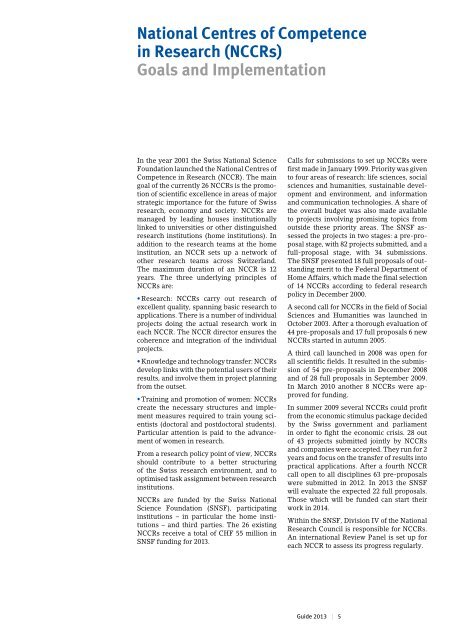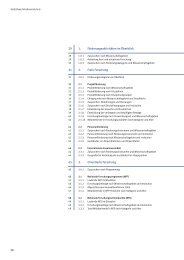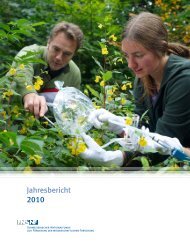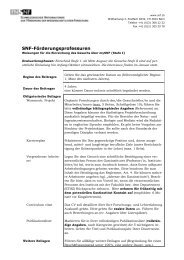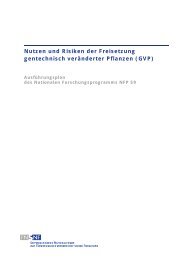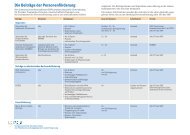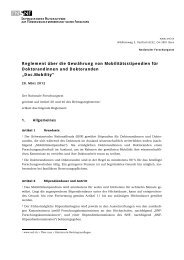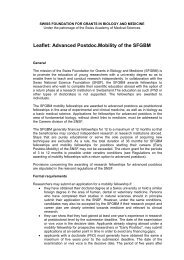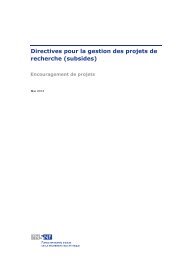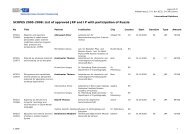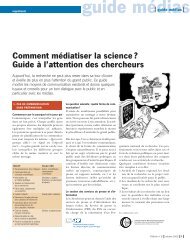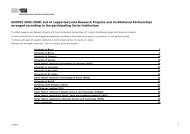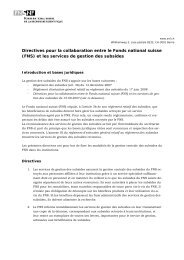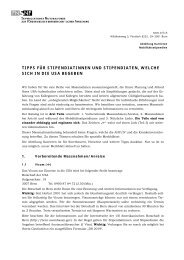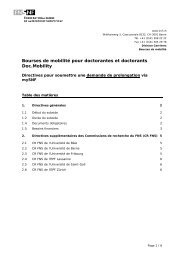NCCR Guide 2013 - Schweizerischer Nationalfonds (SNF)
NCCR Guide 2013 - Schweizerischer Nationalfonds (SNF)
NCCR Guide 2013 - Schweizerischer Nationalfonds (SNF)
Create successful ePaper yourself
Turn your PDF publications into a flip-book with our unique Google optimized e-Paper software.
National Centres of Competence<br />
in Research (<strong>NCCR</strong>s)<br />
Goals and Implementation<br />
In the year 2001 the Swiss National Science<br />
Foundation launched the National Centres of<br />
Competence in Research (<strong>NCCR</strong>). The main<br />
goal of the currently 26 <strong>NCCR</strong>s is the promotion<br />
of scientific excellence in areas of major<br />
strategic importance for the future of Swiss<br />
research, economy and society. <strong>NCCR</strong>s are<br />
managed by leading houses institutionally<br />
linked to universities or other distinguished<br />
research institutions (home institutions). In<br />
addition to the research teams at the home<br />
institution, an <strong>NCCR</strong> sets up a network of<br />
other research teams across Switzerland.<br />
The maximum duration of an <strong>NCCR</strong> is 12<br />
years. The three underlying principles of<br />
<strong>NCCR</strong>s are:<br />
• Research: <strong>NCCR</strong>s carry out research of<br />
excellent quality, spanning basic research to<br />
applications. There is a number of individual<br />
projects doing the actual research work in<br />
each <strong>NCCR</strong>. The <strong>NCCR</strong> director ensures the<br />
coherence and integration of the individual<br />
projects.<br />
• Knowledge and technology transfer: <strong>NCCR</strong>s<br />
develop links with the potential users of their<br />
results, and involve them in project planning<br />
from the outset.<br />
• Training and promotion of women: <strong>NCCR</strong>s<br />
create the necessary structures and implement<br />
measures required to train young scientists<br />
(doctoral and postdoctoral students).<br />
Particular attention is paid to the advancement<br />
of women in research.<br />
From a research policy point of view, <strong>NCCR</strong>s<br />
should contribute to a better structuring<br />
of the Swiss research environment, and to<br />
optimised task assignment between research<br />
institutions.<br />
<strong>NCCR</strong>s are funded by the Swiss National<br />
Science Foundation (SNSF), participating<br />
institutions – in particular the home institutions<br />
– and third parties. The 26 existing<br />
<strong>NCCR</strong>s receive a total of CHF 55 million in<br />
SNSF funding for <strong>2013</strong>.<br />
Calls for submissions to set up <strong>NCCR</strong>s were<br />
first made in January 1999. Priority was given<br />
to four areas of research: life sciences, social<br />
sciences and humanities, sustainable development<br />
and environment, and information<br />
and communication technologies. A share of<br />
the overall budget was also made available<br />
to projects involving promising topics from<br />
outside these priority areas. The SNSF assessed<br />
the projects in two stages: a pre-proposal<br />
stage, with 82 projects submitted, and a<br />
full-proposal stage, with 34 submissions.<br />
The SNSF presented 18 full proposals of outstanding<br />
merit to the Federal Department of<br />
Home Affairs, which made the final selection<br />
of 14 <strong>NCCR</strong>s according to federal research<br />
policy in December 2000.<br />
A second call for <strong>NCCR</strong>s in the field of Social<br />
Sciences and Humanities was launched in<br />
October 2003. After a thorough evaluation of<br />
44 pre-proposals and 17 full proposals 6 new<br />
<strong>NCCR</strong>s started in autumn 2005.<br />
A third call launched in 2008 was open for<br />
all scientific fields. It resulted in the submission<br />
of 54 pre-proposals in December 2008<br />
and of 28 full proposals in September 2009.<br />
In March 2010 another 8 <strong>NCCR</strong>s were approved<br />
for funding.<br />
In summer 2009 several <strong>NCCR</strong>s could profit<br />
from the economic stimulus package decided<br />
by the Swiss government and parliament<br />
in order to fight the economic crisis. 28 out<br />
of 43 projects submitted jointly by <strong>NCCR</strong>s<br />
and companies were accepted. They run for 2<br />
years and focus on the transfer of results into<br />
practical applications. After a fourth <strong>NCCR</strong><br />
call open to all disciplines 63 pre-proposals<br />
were submitted in 2012. In <strong>2013</strong> the SNSF<br />
will evaluate the expected 22 full proposals.<br />
Those which will be funded can start their<br />
work in 2014.<br />
Within the SNSF, Division IV of the National<br />
Research Council is responsible for <strong>NCCR</strong>s.<br />
An international Review Panel is set up for<br />
each <strong>NCCR</strong> to assess its progress regularly.<br />
<strong>Guide</strong> <strong>2013</strong> | 5


